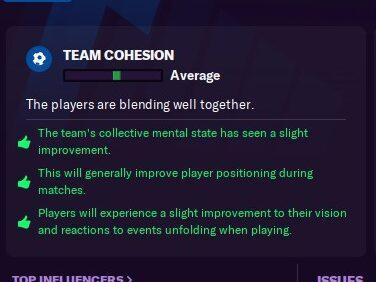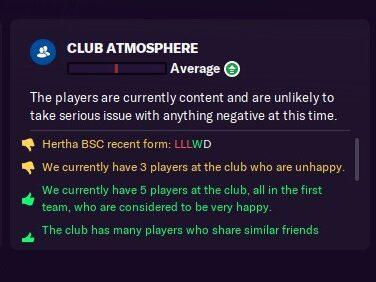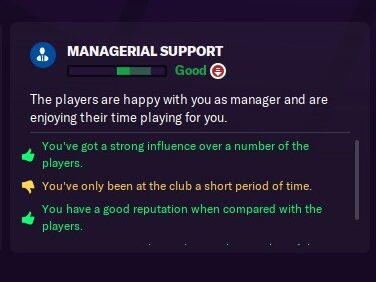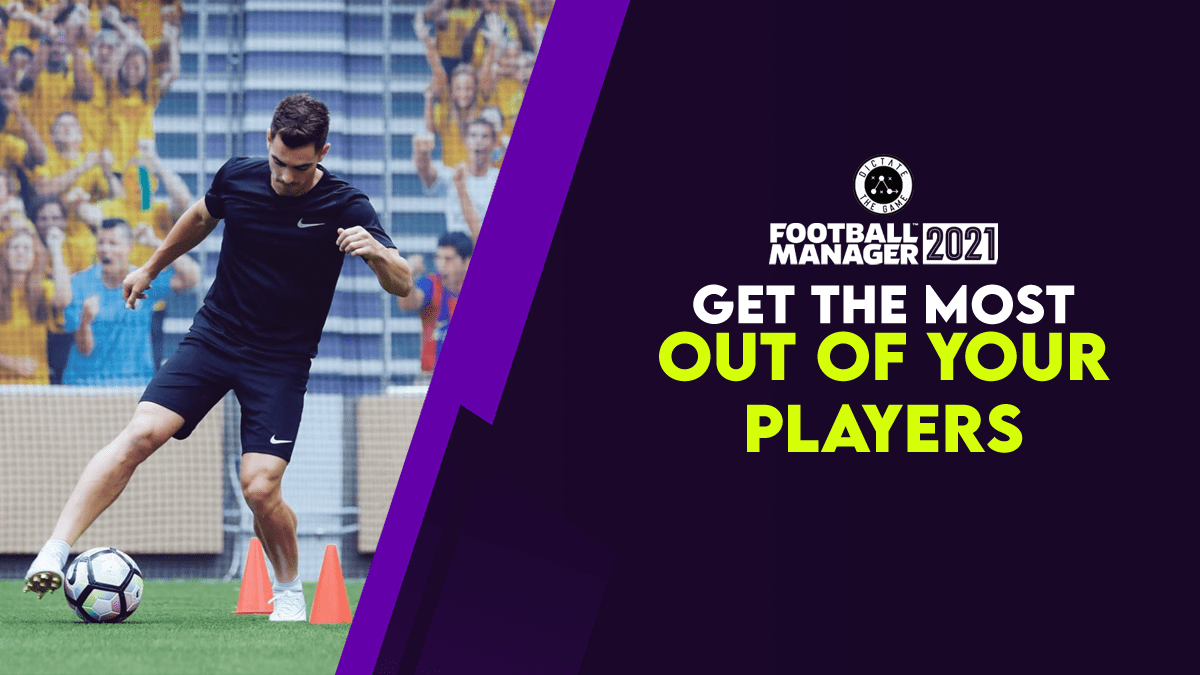
FM21 – Get the most out of your players
Footballers are humans. Albeit sometimes very well paid, slightly pampered, self entitled and warped, but human non the less.
Football Manager gives you the opportunity to dictate these humans virtual lives, and I’ll wager that some of them have tried and tested your patience to the point of almost disliking the real life version of said player, even though he hasn’t wronged you in any way. Read on to find learn some secrets of how to get the most out of your players in Football Manager
Now, before you start falling out with real life 18 year old South American wingers because they wouldn’t sign a new contract at your newly promoted Pontefract Collieiries in the year 2028, this guide will hopefully help you to understand the minds of your players.
How many of you up your man management attribute? How many of you know what the man management attribute actually impacts in the game? “The ability to manage training overall and how the individual interacts with players on a one-to-one basis” BOOM. So what the heck does that even mean? Most Football Managers I know leave training to their assistant manager, so that isn’t relevant. And who talks to players anymore? Well, let me tell you, you should be; talking to players AND taking training.
Last month Craig covered the training aspect of Football Manager, so i don’t need to cover that again. I will be touching on team cohesion in this piece, all of which should help you get the most out of your players in Football Manager.
Dynamics
You know how, in some other video games, you get a little stat boost when you wear a set of armour, or use a magic potion, or something else of the likeness; +5 power when wielding the hammer of lightning or whatever.
Did you know you can get that in Football Manager too? Don’t believe me? Look, I’ll prove it.
+5 (ish) player positioning, +5 (ish) vision and reactions. All just for having average team cohesion? I’ll have some of that. Imagine the bonuses of above average or perfect team cohesion. OK, so I don’t know the exact value of the improvement, but it’s still an improvement, right?
Team cohesion is improved by training, with the match preparation and team bonding (extra curricular) bearing the largest increases. Match prep is something every manager should be doing before a game regardless of where the teams cohesion is at. To increase it quicker, simply do more match prep and team bonding during pre season. A cohesive team plays better, wins more, and is happier. And happy players don’t cause problems. Capiche?
Club atmosphere is a solid marker for the general happiness of the squad. It provides a concise overview whilst taking into account team form, social groups and relationships, training, and staffing and player numbers. As above, a happy dressing room will increase player performance.
Managerial support is how the players feel towards you. It takes into account how (if) you speak to the players, how consistent you are with discipline and promises, and the strength of the relationships you have with players. If you do a Warnock and go to Cornwall everyday, your squad won’t be best pleased with you. Klopp hug every player, and you’ll be a favourite in no time.
Hierarchy and social groups
Within any team you have a leadership hierarchy. The higher up the hierarchy a player is, the more sway he will have over the dressing room. If you are only going to keep one group of players happy during your tenure, make it the team leaders. This have the power to turn the whole dressing room against you. That club atmosphere, managerial support, and team cohesion will take a serious hit in no time at all, if you manage to pee these guys off.
Social groups in the dressing room I like to think of as the ones that sit near each other in the changing room. The ones that are in the group WhatsApp organising the night out. The ultimate goal would be to get every single player into the same social group, but understandably that is difficult, so try get as many as you can into large social groups. Signing players that compliment each other; same nationalities, former teammates, sometimes even the same personalities.
If you have the one or two players that can’t seem to integrate themselves into a social group, try placing them into a mentoring group within that group. Match traits, personalities, nationalities, anything you can find that might help them. Think of them as a real person and help him make friends. It’s a lot easier to get the most out of your players if they’re happy.
Happiness
Individual happiness highlights your strengths and weaknesses at dealing with players. This screen breaks down player happiness. From the promises you’ve made to players, to how they view training, playing time, and your management.
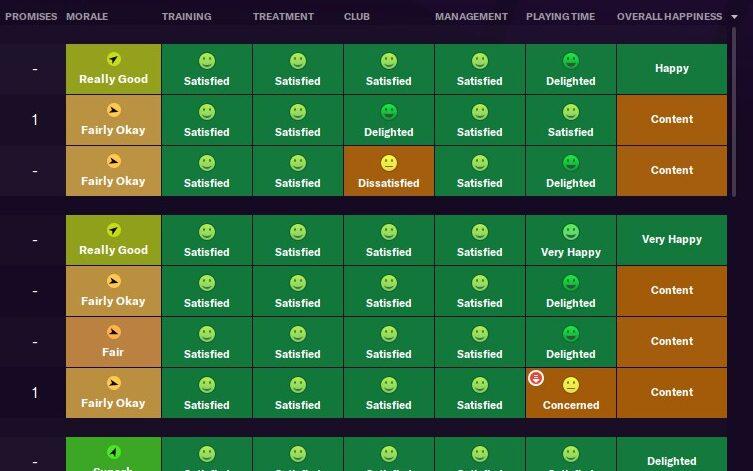
Don’t mistake a players happiness with his morale. Morale can change on a day by day basis, it can be impacted on the team talk after the previous game. Perhaps you won, but called a player out for a particularly poor performance. Morale is an immediate indicator for how you may approach a player for the next game, pick him up and encourage him. Happiness is his overall general feeling.
Team Meeting
If the morale of the squad is low, (again, that doesn’t necessarily mean they are unhappy) you can give an immediate boost to morale using a team meeting. This can challenge the team to raise their game, perhaps after a poor run of form, or it can fire players up just before a big match.
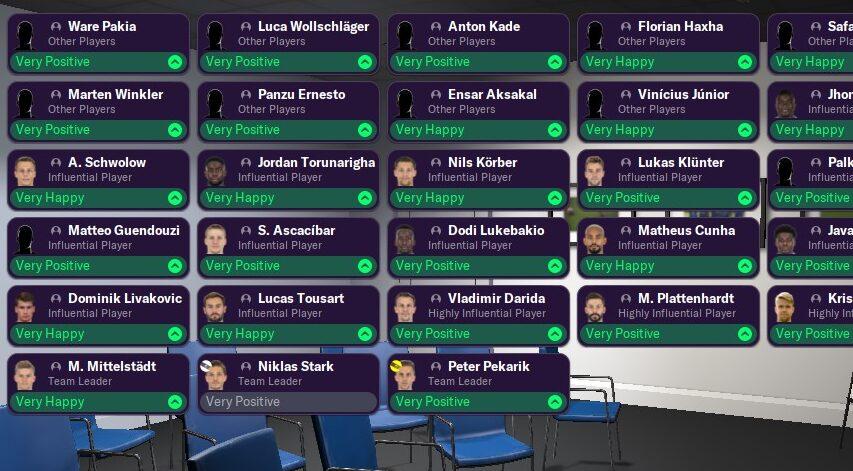
All of the above points increase productivity, performance levels, and positive outputs of your players. Lets dive into the areas we can look to use our man management skills to speed up the process of increasing it. All of which should help you get the most out of your players in Football Manager.
Man Management
Footballers are humans, we mentioned that way back at the beginning. So how do you increase productivity. Incentives are one of the easiest ways. Offer players an incentive for playing well, training well, doing there job. Contracts can offer so many incentives for players, however I know most people do away with the bonuses and addon’s for contracts. Why should a striker get a bonus for doing his job? How about just giving him a bonus for training instead.
Vladimir Darida is in the last few months of his contract in my Hertha Berlin team. He’s a good enough player to be of use, but isn’t likely to be a regular in the team. He’s also a very influential member of the team, so I’d like to keep him around. Problem is, the contract he wants equates to roughly 48k pw; a base salary of 40k pw and 8k in addon’s and bonuses, and that isn’t something I can really afford for a squad player.
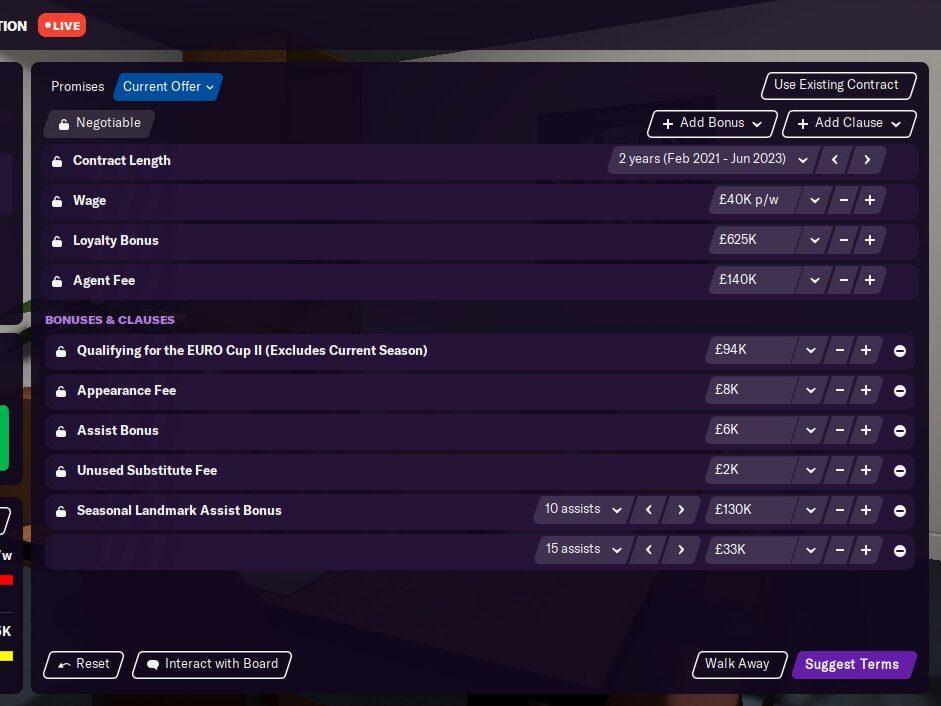
By adjusting the basic weekly wage and the appearance fee, I can incentivise his performances and his training output. If he is on a bad run of form, or simply isn’t training well, he doesn’t play. Therefore, doesn’t get his appearance fee bonus.
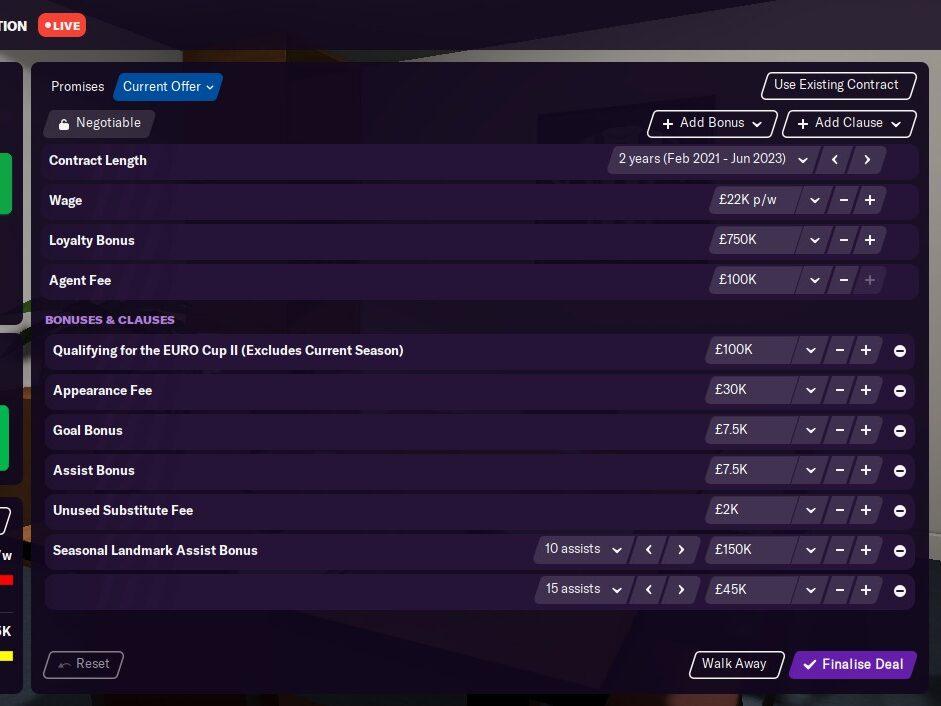
Now, some of you may scoff at the 30k appearance fee, but don’t overlook the basic salary of 22k pw. I’ve saved the club potentially 18k a week in wages, and I only pay that fee IF he deserves it. He’s 31 years old, coming to the end of his career but still a potentially important player to have in the dressing room. If he trains well, and performs well, he gets more money.
Control wage budgets
Unfortunately I don’t have pictures to back this up, but on last years game I managed to massively reduce my clubs wage bill using this method. My entire team, squad status dependant, was on the same wage.
- Star players on 40k pw
- Important players on 30k pw
- Regular starters on 20k pw
- Squad players on 15k pw
- Hot prospects on 5k pw
- Youngsters on 2k pw
All of these had appearance fees to match their initial contract demands. If a squad player wanted a contract circa 50k a week, I offered a basic salary of 15k and an appearance fee of 35k.
Doing this enables you to rotate the squad depending on form and training performances. If you don’t train well, you don’t play. If you don’t perform well, you don’t get your bonus. This should help get the best out of your players in Football Manager. This can be an effective tool for youngsters and fringe players wanting to make a claim for more regular football, start the ones that train well in cup games and see if they grab the chance you give them.
Listen to your players
Players have positive and negative reactions to your decisions. And they tell you, directly and indirectly. Hovering over each column in the happiness section will show you areas they are happy or unhappy with. Alternatively, clicking the player overview and happiness gives a more detailed breakdown of the players views. You can view opinions on training, playing time, his position in the social groups and hierarchy, and his long and short terms ambitions. A player may notice another player has a potential issue and bring it to your attention. A player may be unhappy about something you are unaware of.
A press conference may be the first time you hear of an unhappy player at your club, but make sure you look into why he is unhappy. Usually it’s something you can change with only a few clicks, be it his training schedule, or a playing time issue. Usually a quick chat or a tweak to his training can solve the problem
Player interactions
A players relationship is affected by your interactions with him. Praise his good form or conduct, offer reassurance if he’s going through a bad run of form.
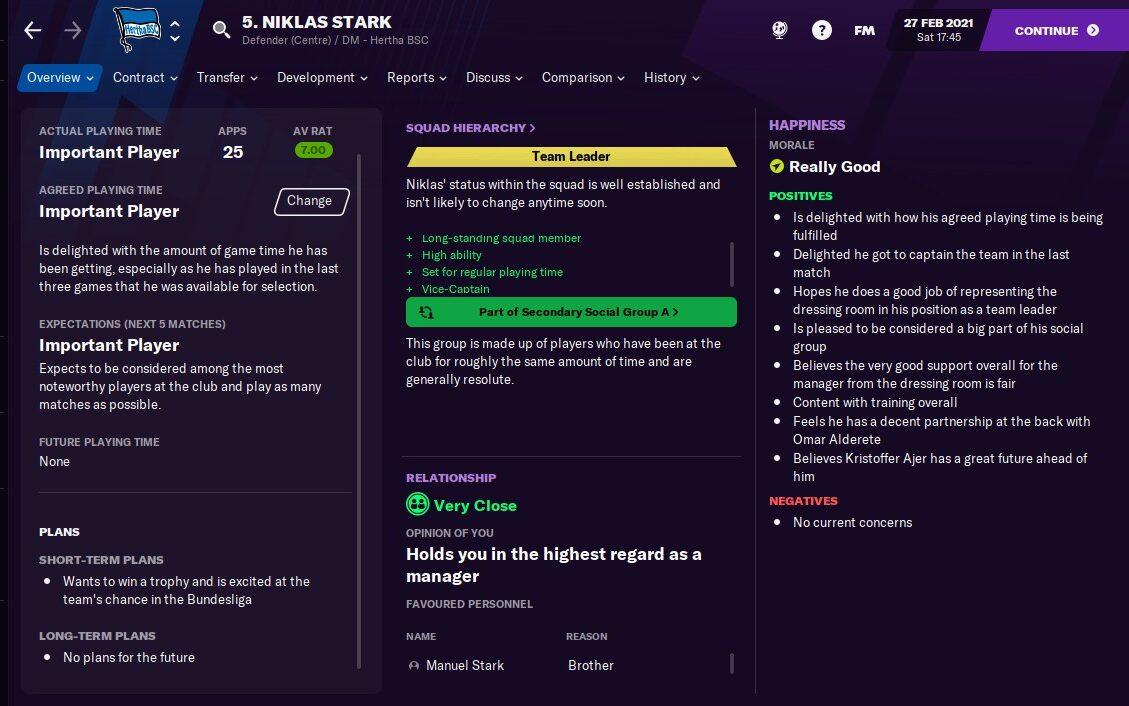
When speaking to a player, think about the gestures you might use; the closer the relationship, the more informal the greeting can be. Niklas Stark for example, gets an arm round him every time. All these things improve player relationships, which in turn improve team cohesion, club atmosphere and managerial support. All of which give you those little boosts during a game.
Ask yourself, would you want to play for a manager that you were unhappy with? Would you want to be a player in YOUR team?
Follow us on Facebook or find us on Twitter for more Football Manager news and content.
Here’s some other Articles you may enjoy:
- Databases to freshen up your save
- Starting a non league save
- Alternative signings: Positional switches
